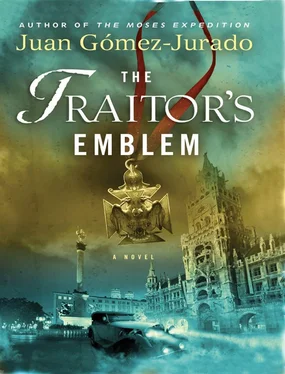Juan Gomez-Jurado - The Traitor's emblem
Здесь есть возможность читать онлайн «Juan Gomez-Jurado - The Traitor's emblem» весь текст электронной книги совершенно бесплатно (целиком полную версию без сокращений). В некоторых случаях можно слушать аудио, скачать через торрент в формате fb2 и присутствует краткое содержание. Жанр: Триллер, на английском языке. Описание произведения, (предисловие) а так же отзывы посетителей доступны на портале библиотеки ЛибКат.
- Название:The Traitor's emblem
- Автор:
- Жанр:
- Год:неизвестен
- ISBN:нет данных
- Рейтинг книги:4 / 5. Голосов: 1
-
Избранное:Добавить в избранное
- Отзывы:
-
Ваша оценка:
- 80
- 1
- 2
- 3
- 4
- 5
The Traitor's emblem: краткое содержание, описание и аннотация
Предлагаем к чтению аннотацию, описание, краткое содержание или предисловие (зависит от того, что написал сам автор книги «The Traitor's emblem»). Если вы не нашли необходимую информацию о книге — напишите в комментариях, мы постараемся отыскать её.
The Traitor's emblem — читать онлайн бесплатно полную книгу (весь текст) целиком
Ниже представлен текст книги, разбитый по страницам. Система сохранения места последней прочитанной страницы, позволяет с удобством читать онлайн бесплатно книгу «The Traitor's emblem», без необходимости каждый раз заново искать на чём Вы остановились. Поставьте закладку, и сможете в любой момент перейти на страницу, на которой закончили чтение.
Интервал:
Закладка:
“No!”
“Or you can leave it on the bed, listen to what I have to say, then give me the dignity of choosing how I’m to go. You decide, Paul, but whatever happens, I will get what I want. What I need.”
Paul sat on the floor, or rather collapsed onto it, clutching the leather bag. For a long while the only sound in the room was the metallic tick of Eduard’s alarm clock. Eduard closed his eyes until he felt a movement on his bed.
His cousin had dropped the leather bag within reach of his hand.
“God forgive me,” said Paul. He was standing at Eduard’s bedside, crying, but not daring to look at him directly.
“Oh, He doesn’t give a damn what we do,” said Eduard, caressing the delicate leather with his fingers. “Thank you, Cousin.”
“Tell me, Eduard. Tell me what you know.”
The wounded man cleared his throat before beginning. He talked slowly, as though each of the words had to be dragged out of his lungs rather than spoken.
“It happened in 1905, which is what they’ve told you, and up to that point what you know is not so far from the truth. I remember clearly that Uncle Hans was on a mission in South-West Africa, because I loved the sound of that word and used to say it again and again as I tried to find the place on the map. One night, when I was ten years old, I heard shouting in the library and went down to see what was happening. I was very surprised that your father had called on us at that time of night. He was in discussion with my father, the two of them sitting at a round table. There were two other people in the room. I could see one of them, a short man with delicate features like a girl’s, who was saying nothing. I couldn’t see the other one from the door but I could hear him. I was about to go in and greet your father-he always brought me presents from his travels-but just before I entered, my mother grabbed me by the ear and dragged me to my room. ‘Did they see you?’ she asked. And I said no, over and over. ‘Well, you’re not to say a word about this, not ever, do you hear me?’ And I
… I swore I’d never tell…”
Eduard’s voice trailed off. Paul grabbed his arm. He wanted him to continue the story, whatever it took, though he was aware of the suffering that it was causing his cousin.
“You and your mother came to live with us two weeks later. You weren’t much more than a baby, and I was pleased, because that meant I had my own platoon of brave soldiers to play with. I didn’t even think about the obvious lie my parents told me: that Uncle Hans’s frigate had gone down. People were saying other things, spreading rumors that your father was a deserter who’d gambled everything away and had disappeared in Africa. Those rumors were just as untrue, but I didn’t think about them, either, and eventually I forgot. Just as I forgot what I heard soon after my mother left my bedroom. Or rather, I pretended that I’d made a mistake, in spite of the fact that no mistake was possible, given the excellent acoustics in this house. Watching you grow up was easy, watching your happy smile as we played hide-and-seek, and I lied to myself. Then you started getting older-old enough to understand. Soon you were as old as I’d been that night. And I went off to war.”
“So tell me what you heard,” said Paul in a whisper.
“That night, Cousin, I heard a shot.”
7
Paul’s understanding of himself and his place in the world had been teetering on the edge for some time, like a porcelain vase at the top of a ladder. That last sentence was the final kick, and the imaginary vase tumbled, shattering into pieces. Paul heard the crash it made as it broke, and Eduard saw it in his face too.
“Forgive me, Paul. Christ help me. You should go now.”
Paul got up and leaned over the bed. His cousin’s skin was cold, and when Paul kissed his forehead, it was like kissing a mirror. He walked to the door, not quite in control of his own legs, only vaguely aware of having left the bedroom door open and of having slumped down on the floor outside.
When the shot rang out, he barely heard it.
But as Eduard had said, the mansion’s acoustics were excellent. The first guests to leave the party, busy exchanging farewells and empty promises as they collected their overcoats, heard a bang that was muffled but unmistakable. They’d heard too many in the preceding weeks to fail to recognize the sound. Their conversations had all ceased by the time the second and third echoes of the report rebounded through the stairwell.
In her role as the perfect hostess, Brunhilda had been saying goodbye to a doctor and his wife whom she couldn’t stand. She identified the sound but automatically activated her defense mechanism.
“The boys must be playing with firecrackers.”
Disbelieving faces popped up around her like mushrooms after a rainstorm. At first there were only a dozen people, but soon more emerged into the hallway. It wouldn’t be long before all the guests knew that something had happened in her house.
In my house!
Within two hours it would be the talk of all Munich if she didn’t do something about it.
“Stay here. I’m sure it’s nothing.”
Brunhilda picked up the pace when she began to smell gunpowder halfway up the stairs. Some of the braver guests were looking up, perhaps hoping she would confirm that they had been mistaken, but not one set foot on the staircase: the social taboo against entering a bedroom during a party was too strong. The murmuring grew, however, and the baroness hoped Otto would not be so foolish as to follow her, as someone would inevitably want to accompany him.
When she reached the top and saw Paul sobbing in the corridor, she knew what had happened without putting her head around Eduard’s door.
But she did anyway.
A spasm of bile rose to her throat. She was gripped by horror and by another incongruous feeling that she would recognize only later, with self-disgust, as relief. Or at least the disappearance of the oppressive feeling she’d been carrying in her breast ever since her son had returned, maimed, from the war.
“What have you done?” she cried, looking at Paul. “I’m asking you: What have you done?”
The boy didn’t raise his head from his hands.
“What did you do to my father, you witch?”
Brunhilda took a step back. For the second time that night, someone had recoiled at the mention of Hans Reiner, but ironically the person doing it now was the same one who had used his name as a threat earlier.
How much do you know, child? How much did he tell you before… ?
She wanted to scream, but she couldn’t: she didn’t dare.
Instead, she squeezed her hands into fists until her nails stuck into her palms, trying to calm herself and decide what to do, just as she had done that night fourteen years earlier. And when she had managed to recover a minimum of composure, she went back downstairs. On the first floor she poked her head over the banister and smiled down into the entrance hall. She didn’t dare go any farther, because she didn’t think she could keep up the pretense for long in front of that sea of tense faces.
“You’ll have to excuse us. Friends of my son have been playing with firecrackers, just as I thought. If you don’t mind I’ll deal with the chaos they’ve caused up there”-she gestured to Paul’s mother-“Ilse, my dear.”
The faces softened when they heard this, and the guests relaxed when they saw the housekeeper following their hostess up the stairs as though nothing were wrong. They already had plenty of gossip about the party, and could hardly wait to get home to bore their families with it.
“Don’t even think about screaming,” was the only thing Brunhilda said.
Ilse had been expecting some childish mischief, but when she saw Paul in the corridor, she was afraid. Then, when she half opened Eduard’s door, she had to bite her fist to stop herself from screaming. Her reaction was not so very different from that of the baroness, except that with Ilse there were tears as well as horror.
Читать дальшеИнтервал:
Закладка:
Похожие книги на «The Traitor's emblem»
Представляем Вашему вниманию похожие книги на «The Traitor's emblem» списком для выбора. Мы отобрали схожую по названию и смыслу литературу в надежде предоставить читателям больше вариантов отыскать новые, интересные, ещё непрочитанные произведения.
Обсуждение, отзывы о книге «The Traitor's emblem» и просто собственные мнения читателей. Оставьте ваши комментарии, напишите, что Вы думаете о произведении, его смысле или главных героях. Укажите что конкретно понравилось, а что нет, и почему Вы так считаете.












